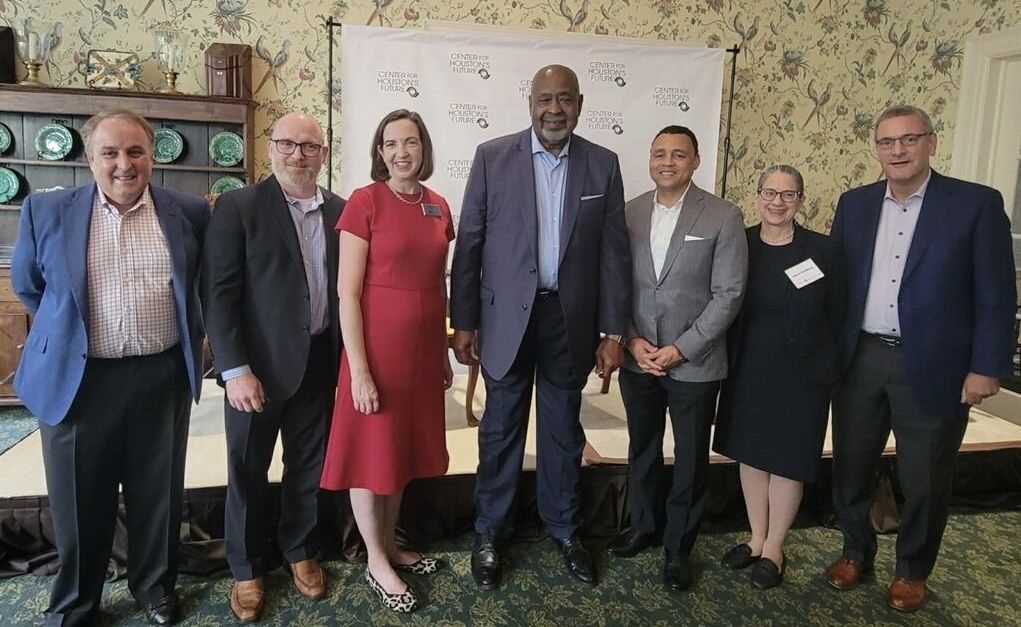Why it would be 'potentially catastrophic' not to include communities in the energy transition
overheard
As the energy sector transitions toward a more sustainable future, a Houston organization is driving forward the idea to do so with a community-based approach, as some experts discussed at a recent breakfast panel.
The Center for Houston's Future hosted a breakfast discussion on August 10, entitled "Building a Community-Based Approach to the Energy Transition," sponsored by BP Energy. The conversation covered various ways corporations, organizations, and individuals could work together to build this approach, including through education, upskilling, collaborations, and more.

The event kicked off with a keynote address from Brad Townsend, vice president of policy and outreach at the Center for Climate and Energy Solutions, who set the scene for the discussion.
“The energy transition offers an opportunity to build a thriving, just, and resilient net-zero economy that can benefit companies and communities alike" he says to the crowd. "It’s the chance to raise jobs standards and safely through local and federal policies, employ a practice change, cross-sector collaboration, and worker training.
“It's also an opportunity to diversify the workforce to better reflect local communities, including in Houston," he continues. "If we approach this engagement however as a box checking exercise or unwilling to really provide communities an opportunity to help shape projects, we’re destined to fail. Being genuinely open to feedback from communities and actively incorporating them into the decision-making process is foundational to generating the community buy-in that will be crucial to a successful energy transition.”
Here were some of the key takeaways from the event.
"When we talk about Houston we need to be cognizant that it is a huge geographical area, and you cannot speak to Houston as a monolith. You can't even speak to individual communities as single entities."
— Anne Bartlett, vice president of industry and community resources at Brazosport College.
"Our responsibility is to recognize and really understand our communities not just from labor market data perspective, but also by having conversations with people who know what’s happening on the ground," she continues. "Our charge is to recognize that yes, this is a regional opportunity but it really does need to be situationalized in our specific communities and recognize the strengths and the opportunities that are present in all of those."
"One of the opportunities and challenges that's part of this massive energy transition, which I think will not only bring about investments of billions of dollars but potentially trillions of dollars, is to utilize these significant investments as an opportunity to not only transform how we make, use, and transport energy, but also uplift these communities that are adjacent to the facilities where hydrogen and other resources will be will be produced."
— John Hall, president and CEO of Houston Advanced Research Center.
"We (need to) use this entire transformational effort to open the doors of opportunity for every community," he adds.
“While it is the right thing to do to bring in the full breath of diversity that we have, it's (also) absolutely necessary.”
— Mark Crawford, senior vice president at BP Energy.
"We're in in Houston. We are the most diverse city in the United States, and the United States is becoming more and more diverse," he explains.
"It is important to bring holistic solutions to communities. ... We can't do everything, but there are organizations working on the ground that are doing really great work. It's about companies going in and partnering with stakeholders on the ground who understand the communities so that we are bringing these wrap-around services."
— Crawford continues, noting that it's on companies like BP to tap into and support local entities.
“There's a fundamental shift that needs to happen in the way that we're talking about these jobs to really encourage young people to take advantage of resources that are made available, because we can integrate that into the educational curriculum, but unless students and young people are willing to move in that direction it's not going to make a difference.”
— Townsend says on the panel, addressing the sentiment that young people are told job security comes only with a college degree. The panelists agree this isn't the case anymore, yet that message is still being conveyed.
“I think it's really important to pull back and recognize the opportunity that's in the K-12 space — not only with the children and making sure that they're aware that these careers even exist, but perhaps just as importantly with their parents.”
— Bartlett says, adding that these kids will be the ones in thes jobs in 10 or so years, so that message needs to start being conveyed now.
“All of these things cost money. There are dollars that are out there right now that we are not leveraging — there are dollars that are available through the Texas Workforce Commission, through Chambers of Commerce. So, we're not talking about having to reinvent the wheel and having to go to our industry partners with palms up, we're talking about leveraging the resources that are already out there in a wiser way.”
— Bartlett says about the feasibility of workforce development programs.
“It would be unfortunate — (and) it would be potentially catastrophic — if we see the trillions and trillions of dollars invested over the next 20 years, and we have left behind 25 percent or more of citizens.”
— Hall says, emphasizing how important working with communities — and hearing their concerns — is to this process.
He later adds that he's worked with community leaders, and he knows they are optimistic — as is he — about this process. “These are not peculiar human beings. They have the same hopes and dreams that we have, and if we will take the step to just reach out and connect and communicate with sincerity, then those barriers are easier to overcome.”





